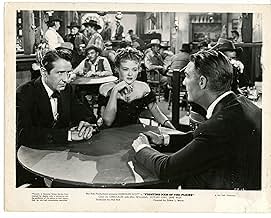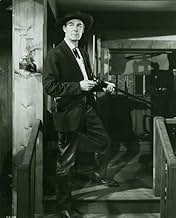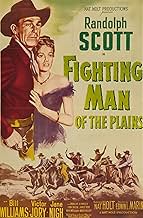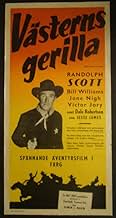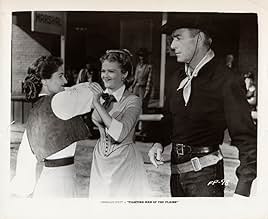IMDb RATING
6.5/10
600
YOUR RATING
Former bandit Jim Dancer becomes marshal of a Kansas town and cleans up the criminal element--with help from an old pal, Jesse James.Former bandit Jim Dancer becomes marshal of a Kansas town and cleans up the criminal element--with help from an old pal, Jesse James.Former bandit Jim Dancer becomes marshal of a Kansas town and cleans up the criminal element--with help from an old pal, Jesse James.
Featured reviews
I was just 6 years old when I saw "Fighting Man of the Plains"...my parents took me and my sisters to a drive-in movie in Indianapolis, Indiana. We used to go to the drive-in about once a month, because it was the best way for a young family to get a night out. What I remember most about the film is that rather early-on Randolph Scott is under arrest, and he and the lawman are taking a small raft-like ferry across some water, when a horse rears-up and its hoof smashes the lawman in the face. The movie was in color, and the close-up of the bloody face was mesmerizing. Randolph Scott then assumed the lawman's identity and went on to bring law and order to a lawless Kansas town. I grew-up to become a successful television news anchor/reporter and video producer...but I would love to see "Fighting Man of the Plains" again. It was a seminal moment in my childhood, and forever marked Randolph Scott...and westerns...as some of my favorite movie fare.
Although I only saw this film once (when it was released 50 years ago), it is one of my favorite Randolph Scott westerns. The combination of a turbulent setting (Quantrill's murderous raid on Lawrenceville, Kansas, and post Civil War Kansas ) and the main character's efforts to atone for his wartime actions by keeping the peace in a violence prone Kansas cow town rank it even with or better than Scott's later films directed by the acclaimed director, Budd Boetticher.
After a fast start, this western settles into what amounts to a plot-heavy gab fest. I'm afraid fans expecting hard-riding, fast-shooting, or scenic horizons, are going to be disappointed. Not that everything is downside. No western with the great Randy Scott can be overlooked; also, perennial bad guy Victor Jory gets to essay a good guy, for a change. And, I really like Bill Williams as a boyishly unlikely gunsel. Then add pudgy, squinty-eyed Barry Kelley as the lead black hat, and it's a fine cast.
Too bad indie producer Nat Holt apparently spent everything on casting since it left him little for filming outside of studio sets. This results in a basically 'indoor' western with some action in the streets. Maybe that's the result of adapting Gruber's novel to the screen and leaving little out. So you may need a scorecard to keep up with all the characters and plot developments.
One thing to notice— how county officials are really being shown as in on the graft. I love that scene where justice of the peace (Williams) gouges penalty money out of anyone who dares speak up and then splits it up with his cronies. That's certainly no western cliché. All in all, the movie's long on complex story but short on traditional outdoor visuals. Still, even here, no one looks more the western hero than the iron-jawed Scott.
Too bad indie producer Nat Holt apparently spent everything on casting since it left him little for filming outside of studio sets. This results in a basically 'indoor' western with some action in the streets. Maybe that's the result of adapting Gruber's novel to the screen and leaving little out. So you may need a scorecard to keep up with all the characters and plot developments.
One thing to notice— how county officials are really being shown as in on the graft. I love that scene where justice of the peace (Williams) gouges penalty money out of anyone who dares speak up and then splits it up with his cronies. That's certainly no western cliché. All in all, the movie's long on complex story but short on traditional outdoor visuals. Still, even here, no one looks more the western hero than the iron-jawed Scott.
Directed by Edwin L. Marin and written by Frank Gruber, Fighting Man of the Plains stars Randolph Scott, Victor Jory and Jane Nigh. Music is by Paul Sawtell and cinematography by Fred Jackman Jr.
A solid and sturdy Marin and Scott Oater that finds Scott as an ex Quantrill raider assuming the identity of a dead detective in a post Civil War Lanyard, Kansas. Proving himself as a fellow made of stern stuff, he's quickly appointed Marshal and begins to clean up the town, but his past is sure to catch up with him...
Without breaking any new ground this still manages to get the key ingredients right in the name of entertainment. The script is sharp, the performances equally so (Jory is excellent), and Marin being the good old pro that he was, pushes things along at a good clip.
There's a lot going on in Lanyard, with various underhand plottings and a few vengeful motivations. While of course there's some simmering passion waiting to explode. The many key characterisations are richly born out, the action healthy, and there's even a couple of surprises along the way to keep the plotting interesting.
A couple of errors out there in the intranet universe need correcting. Some have it that Dale Robertson as Jesse James plays a big part in the cleaning up of Lanyard (yes Jesse is kind of a good bad guy here), but he doesn't as he's barely in it, but he does have a key scene to play in pics finale. So fans of Robertson, in what is believed to be his first credited role, should take that on board.
Secondly. I read a review that states Jory's Dave Oldham character is one of the shifty villains of the piece! He really isn't, he's firmly a friend and ally to Jim Dancer (AKA: Marshal Cummings), and it is he who is the one helping to clean up Lanyard. Another thing of note, filmed in Cinecolor, there seems to only be black and white prints of the movie available to view? Which is actually OK as the print I saw had that late 40s noirish vibe to the photography, but you would like to have the option of seeing the colour print for sure. 7/10
A solid and sturdy Marin and Scott Oater that finds Scott as an ex Quantrill raider assuming the identity of a dead detective in a post Civil War Lanyard, Kansas. Proving himself as a fellow made of stern stuff, he's quickly appointed Marshal and begins to clean up the town, but his past is sure to catch up with him...
Without breaking any new ground this still manages to get the key ingredients right in the name of entertainment. The script is sharp, the performances equally so (Jory is excellent), and Marin being the good old pro that he was, pushes things along at a good clip.
There's a lot going on in Lanyard, with various underhand plottings and a few vengeful motivations. While of course there's some simmering passion waiting to explode. The many key characterisations are richly born out, the action healthy, and there's even a couple of surprises along the way to keep the plotting interesting.
A couple of errors out there in the intranet universe need correcting. Some have it that Dale Robertson as Jesse James plays a big part in the cleaning up of Lanyard (yes Jesse is kind of a good bad guy here), but he doesn't as he's barely in it, but he does have a key scene to play in pics finale. So fans of Robertson, in what is believed to be his first credited role, should take that on board.
Secondly. I read a review that states Jory's Dave Oldham character is one of the shifty villains of the piece! He really isn't, he's firmly a friend and ally to Jim Dancer (AKA: Marshal Cummings), and it is he who is the one helping to clean up Lanyard. Another thing of note, filmed in Cinecolor, there seems to only be black and white prints of the movie available to view? Which is actually OK as the print I saw had that late 40s noirish vibe to the photography, but you would like to have the option of seeing the colour print for sure. 7/10
This is a real humdinger of a western. The plot and dialogue move along quickly, with no time wasted on unlikely romance or saloon song. On the contrary, this tight little gem centers fully and solely on the great Randolph Scott. Here, Scott is at his lean, trim, handsomest best; the director senses this, and the film is noteworthy for featuring a number of lovely, soft, lingering close-ups of Randolph's grim face. To me, this is a wonderful touch and a delightful tribute to one the Westerns' greatest stars.
The co-stars are fine as well, but they definitely play second fiddle to Scott. One unexpected twist involves the town's "tinhorn" gambler, played by Victor Jory. Jory is the only member of the town to recognize Scott as a wanted outlaw, and is certainly in a position to blackmail him; however, in a quite unusual development, Jory chooses to befriend Scott, and remains his loyal friend to the end.
"Fighting Man on the Plains" is the perfect late-40's Western, a fully mature old-fashioned good-guys vs. bad-guys bit of adult theatre, a genre film crafted to its full potential; and it sets the stage nicely for the more psychologically complex Westerns of the 50's.
Highly recommended for lovers of Westerns.
The co-stars are fine as well, but they definitely play second fiddle to Scott. One unexpected twist involves the town's "tinhorn" gambler, played by Victor Jory. Jory is the only member of the town to recognize Scott as a wanted outlaw, and is certainly in a position to blackmail him; however, in a quite unusual development, Jory chooses to befriend Scott, and remains his loyal friend to the end.
"Fighting Man on the Plains" is the perfect late-40's Western, a fully mature old-fashioned good-guys vs. bad-guys bit of adult theatre, a genre film crafted to its full potential; and it sets the stage nicely for the more psychologically complex Westerns of the 50's.
Highly recommended for lovers of Westerns.
Did you know
- TriviaJames Millican portrays a private detective who arrests Randolph Scott, who is playing a former member of Quantrell's Raiders. In Les Massacreurs du Kansas (1953), Millican plays Quantrell and once again, Scott is one of his former Raiders.
- Crazy creditsOpening credits prologue:
The vast plains of the American West proved a barrier so formidable that the westward march of civilization faltered before it for more than a decade. Yet Civilization must move on and the Great Plains were finally conquered. This is the story of one of these builders of the West ... Jim Dancer, bad man, outlaw ..... Fighting man of the plains.
During the desperate days of the Civil War-August 21, 1863,- Quantrell's raid on Lawrence, Kansas.
The bloody war between the states finally came to an end, but on the border the hatreds had been too great. Men continued to ride and fight and die. The name of Quantrell was heard no more, but new names were whispered, names of men who had ridden with Quantrell and were now outlaws.
1868 ARCH CLEMENTS 1869 THE YOUNGER BROTHERS 1870 JESSE JAMES 1871 JIM DANCER 1872 -
- ConnectionsReferenced in Unguarded Moment (1951)
Details
- Release date
- Country of origin
- Language
- Also known as
- Fighting Man of the Plains
- Filming locations
- Production company
- See more company credits at IMDbPro
- Runtime1 hour 34 minutes
- Aspect ratio
- 1.37 : 1
Contribute to this page
Suggest an edit or add missing content

Top Gap
By what name was L'Homme de Kansas City (1949) officially released in India in English?
Answer
